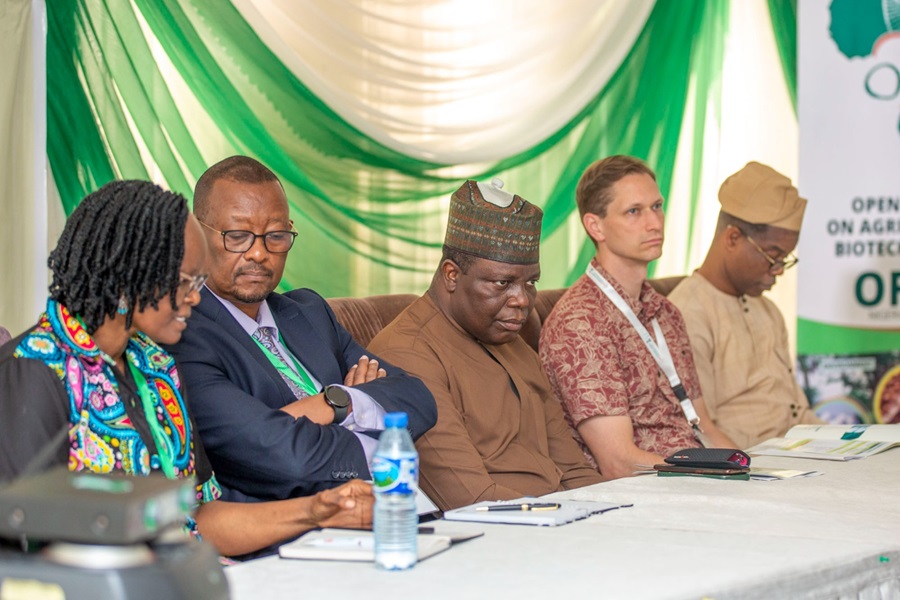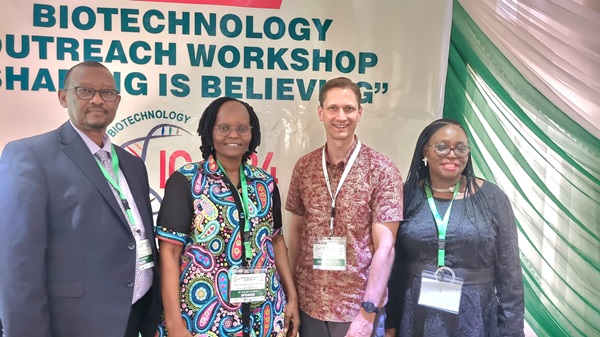
The executive director of the National Root Crops Research Institute (NRCRI), Umudike, Prof. Chiedozie Egesi has identified innovative technologies like biotechnology to proffer solutions for enhancing agricultural productivity and sustainability.
The director-general’s comments came in the wake of Nigeria’s 109th ranking out of 125 countries with sufficient data to calculate the 2023 Global Hunger Index (GHI). He made this assertion in his keynote address, “The Role of Biotechnology in Sustainable Agriculture,” during the Biotechnology Outreach Workshop “Sharing Is Believing,” a side event organised by the National Biotechnology Research Development Agency (NBRDA) with support from the United States Department of Agriculture at the ongoing International Conference on Biotechnology 2024 (ICoB24) in Abuja.
Egesi revealed that Nigeria’s GHI has steadily declined over the past 24 years, with a score of 28.3 in the 2023 Global Hunger Index, indicating a serious level of hunger. He identified pandemics such as COVID-19, climate change, conflict and wars, the rising cost of living, and other factors as significant contributors to hunger in Nigeria. To reverse this trend, Egesi emphasised the need to embrace innovative technologies like biotechnology, which offers promising solutions for enhancing agricultural productivity and sustainability.
“Biotechnology in agriculture has evolved significantly since its early applications,” Egesi said. “From traditional breeding techniques to modern genetic engineering, the journey has been marked by numerous milestones. Key developments include the advent of genetically modified organisms (GMOs) in the 1990s and recent breakthroughs in gene editing technologies such as CRISPR-Cas9.”
Egesi highlighted several emerging trends in agricultural biotechnology, including next-generation biotechnologies, synthetic biology, advanced gene editing techniques, precision agriculture, digital and smart farming and global collaboration. He called for continued research, supportive policies, and public engagement to realise the full potential of biotechnology in agriculture.
Director-general of NBRDA, Prof. Abdullahi Mustapha echoed Egesi’s sentiments, stating that biotechnology is at the forefront of scientific innovation, transforming healthcare, agriculture, environmental conservation and beyond. He emphasised that Nigerians are not just witnesses but active participants in a revolution that promises to redefine the nation’s future.
Mustapha pointed out that the theme “Sharing is Believing” resonates deeply in biotechnology, where collaboration and knowledge-sharing are essential. “No single entity can advance biotechnology alone; it requires concerted efforts from governments, research institutions, private sector stakeholders and the global community,” he explained.

“At NABDA, we champion collaborative research and the open exchange of knowledge to drive biotechnology development and application, improving lives and contributing to the global knowledge economy. International cooperation has led to significant breakthroughs, such as the rapid development of COVID-19 vaccines, reinforcing our belief that sharing knowledge and resources is imperative.”
Mustapha encouraged participants to embrace the spirit of collaboration, explore new avenues for cooperation, identify common goals, and work towards sustainable solutions to pressing challenges. “This event will foster meaningful interactions, new partnerships, and reinforce existing ones. Let us leverage this opportunity to build bridges, share innovations, and inspire each other to achieve greater heights in biotechnology,” he added.
Agricultural counsellor at the United States Department of Agriculture, Foreign Agricultural Service, Chris Bielecki supported the “Sharing is Believing” initiative, emphasising the importance of knowledge sharing in agricultural production, trade, biotechnology development and regulation. “We believe that sharing ultimately leads to believing, so we are encouraging Nigerian scientists, researchers, policymakers, and regulators to share their work on specific crops,” he said.
Bielecki cited Nigeria’s development of Bt Cotton, Cowpea, and TELA Maize as examples of successful biotechnology applications. “Representing the USDA, I am willing to share what the USDA is doing regarding biotechnology regulation and agricultural trade and production,” he added.
Executive director of the Africa Agricultural Technology Foundation (AATF), Dr. Canisius Kanangire emphasised that biotechnology could help eradicate hunger in Africa. He called on scientists, researchers and other key stakeholders to embark on public enlightenment and sensitisation about the importance of agricultural biotechnology. Kanangire identified poor agronomical practices, climate change, poor post-harvest management, inadequate infrastructure, limited access to finance and insufficient extension services as challenges confronting agricultural productivity in Africa. He called for the deployment of science, technology and innovation to defeat hunger on the continent.
Director of the Agricultural Biotechnology Department at NBRDA, Dr. Rose Gidado stated that the workshop aimed to expand the mission’s network of like-minded government and private sector partners willing and able to advocate the benefits of agricultural biotechnology in Nigeria. “In recognition of Nigeria’s sustained leadership in biotechnology, this outreach project will allow stakeholders to review their successes, share policies, regulations and best practices that make these success stories possible,” she added.
Gidado explained that the project would provide a platform for sharing advances, challenges and next steps across various projects and their development stages, fostering a comprehensive approach to leveraging biotechnology for sustainable agricultural development in Nigeria.


